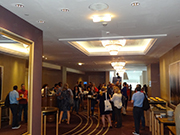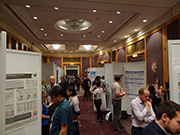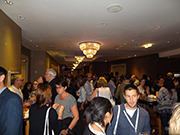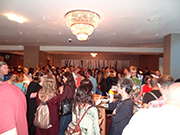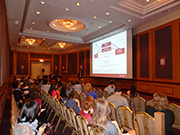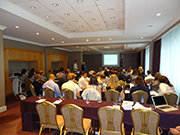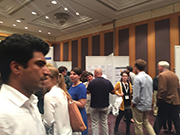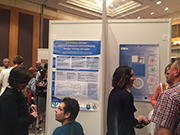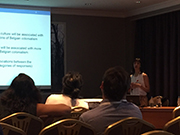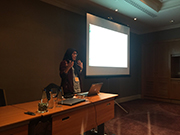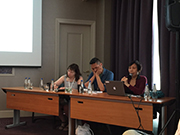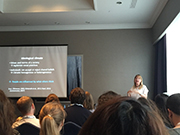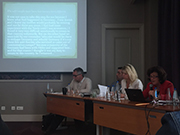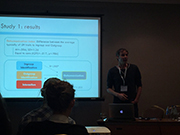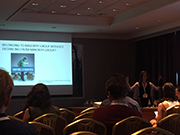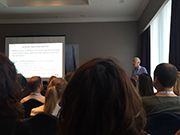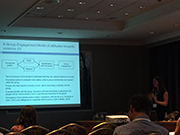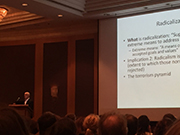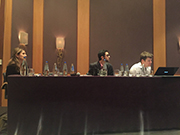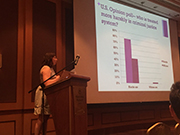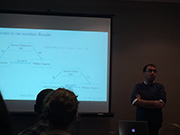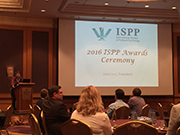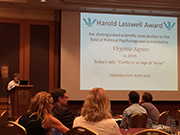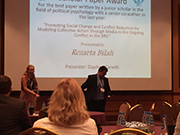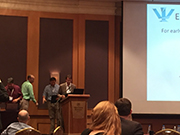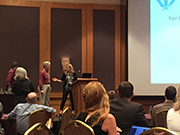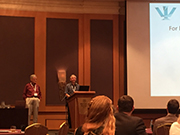President: John Jost (New York University)
Conference Chairs: Aleksandra Cichocka (University of Kent), Michal Bilewicz (University of Warsaw), and Christopher Federico (University of Minnesota)
13-16 July 2016 | Warsaw, Poland
Conference Program (PDF)
The 39th Annual Meeting of ISPP, which was held in at the Sheraton Warsaw Hotel in Poland in July of 2016, was the second-largest conference in the organization’s history to date, with 655 registrants. The conference theme was “The Good Society: Prospects for Reason, Communication, and Well-Being.” The scientific program, which was organized by Chris Federico, Aleksandra Cichocka, and Michal Bilewicz, was very strong. Keynote speakers Jan Gross (a historian), Diana Mutz (an expert in political communication), and Arie Kruglanski (a social psychologist) drew standing-room-only audiences, as did ISPP president, John Jost, in his welcoming address on opening night. There were over a dozen special invited symposia and roundtables on historical and contemporary issues, including the 1989 agreement between leaders of the Polish government and the Solidarity movement, individual and collective reactions to terrorist attacks, and the role of political psychology in the news. Conference attendees, who came from as far away as Argentina, Indonesia and New Zealand, enjoyed evenings in the Old Town, the Vistula Riverbank, and the historical Royal Route. The ISPP Summer Academy, as well as several events organized by the Early Career Committee (Mentoring Lunch, Social Hour and an “Elevator Pitch” workshop) attracted large audiences, as did the poster sessions, which were much more extensive than in the past and very well attended. Those in attendance had a wonderful time in Warsaw and found the intellectual atmosphere of the conference to be especially inspiring. In his Presidential Address, John Jost discussed Ideological Assymetries and the Essence of Political Psychology.
2016 Award Winners

The 2016 Harold Lasswell Award for distinguished scientific contribution goes to Linda Skitka, Professor of Psychology at the University of Illinois at Chicago.
With more than 98 peer-reviewed publications, including articles, book chapters, and an edited book, Professor Skitka has made a major contribution to political psychology. Employing surveys, experiments, and, longitudinal studies, she has shaped our theoretical explanation and descriptive picture of political decision-making. Skikta’s contingency model of distributive justice has been particularly influential. Where previous explanations of how people allocate public resources relied on either the size of the resource pool or the perceived cause of the claimants’ needs, Skitka discovered that both these considerations contribute to distributive judgments. Skitka also developed and tested a model that explained when and why liberals and conservatives make similar, and when they made different attributions when it comes deservingness. Her motivated correction model integrated previous work on attributions and political ideology with basic social cognitive models of updating and preference adjustment.
Skikta’s research has also shed light on the role perceptions of procedural fairness play when people decide what is just. People, it turns out, put less weight on procedural fairness when outcomes do not align with their moral values. Moral convictions, Skikta finds, are a uniquely powerful type of attitude. They shape how people react to authority figures, whether they conform to group norms, tolerate those that disagree with them, or act to advance their own convictions. Subsequent studies have found that moral conviction also affects the likelihood of collective action and the character of political debates.
Linda Skikta has worked with numerous co-authors and trained a steady stream of students contributing not only to our understanding of political psychology but also to our scholarly community in lasting ways. Consequently, it is a pleasure to present the Lasswell Award to her.

The 2016 Nevitt Sanford Award for distinguished professional contributions to political psychology goes to Jon Krosnick, Professor of Communication, Political Science and Psychology, and director of the Political Psychology Research Group at Stanford University.
Krosnick has co-authored three books on survey research, polling, and data analysis. He has edited a book on attitude strength and another one comparing how experts and novices think about politics. He is the author or co-author of more than 145 peer-reviewed articles and more than 30 other academic and governmental reports. Krosnick’s research has explored numerous substantive topics including election forecasting, voting behavior, the affect of negative advertising on voter turnout, popular beliefs about health related behaviors such as smoking, and public opinions about environmental policy and climate change among others. He has also explored how the news media affects opinion and how people decide which media to use as well as how political campaigns shape thinking and action. His work has shed new light on the nature and distribution of opinions and its likely affect on political behavior in numerous populations, and, perhaps even more importantly on how to elicit, to measure, and to analyze individual beliefs and public opinion.
Krosnick has served as a consultant for government agencies, universities, and businesses as well as numerous media outlets and has testified as an expert witness in court proceedings. His knowledge about and experience with questionnaire design and the practice of polling has led him to be not only a highly sought after consultant but a co-principal investigator of the American National Election Study, the United States’ long-running and most comprehensive research project exploring voter decision-making. Krosnick has pioneered new ways to ask, frame, and structure questions as well as how to order them. In addition, he has discovered how these variations in questionnaire design along with the mode of conducting interviews, for example, face-to-face versus over the phone, affects responses and the understanding of beliefs and public opinion. Krosnick has also contributed new methods for eliciting what can be sensitive and difficult to measure attitudes such as those related to race.
Beyond his contribution as a scholar and practitioner, Krosnick has been a popular and generous teacher. He has trained numerous PhD students and has been involved as a principal organizer of the Summer Institute for Political Psychology (SIPP) for more than twenty years. For the past decade, he has organized and hosted SIPP at Stanford University and helped to launch hundreds of new scholars into the field.


This year there are two recipients of the Jeanne Knutson Award for long-standing service to the society. Their names will come as no surprise to our members: Leonie Huddy and Stanley Feldman (both Stony Brook University, New York). Their respective contributions to ISPP are so abundant -- and so deeply appreciated by all of us -- that we have time only to touch on some representative examples of dedicated and distinguished service to ISPP.
Leonie has served as Vice President and President of ISPP. She served as co-editor of Political Psychology from 2005 to 2010 (having served previously on the Editorial Board and before that as a member of the Publications Board). She was a co-editor of the 2003 Oxford Handbook of Political Psychology and also a co-editor of the 2nd edition in 2013. She is the recipient of the 2014 Nevitt Sanford Award for a scholar who is “engaged in the practical application of political psychological principles, or creating knowledge that is accessible and used by practitioners to make a positive difference in the way politics is carried out.” She has also chaired the selection committee for that award. She has helped lead ISPP’s Summer Academy since it was inaugurated in 2011 at the annual conference in Istanbul. She has been a co-convener of the political psychology workshop at Columbia since 1990.
Stanley has served as Vice President and President of ISPP (and prior to that as a member of the Governing Council). For five years he was a co-editor of Political Psychology. By our count his first article published in the journal was in 1997, the first of his many contributions. He is the recipient of the 2015 Nevitt Sanford Award. He has been instrumental in organizing the ISPP Summer Academy. He has played an especially important role in linking the fields of political psychology and political science. He has chaired the Political Psychology Section of the American Political Science Association.

ISPP is delighted to present the Markwell Media Award to Dr. Melissa Harris-Perry (MSNBC). Dr. Perry is the Maya Angelou Presidential Chair at Wake Forest University, where she also directs the Pro Humanitate Institute and also the Anna Julia Cooper Center, which seeks to advance justice through intersectional scholarship. Her PhD in political science is from Duke University, and she has been a professor at the University of Chicago, Princeton University, and Tulane University. She was called “one of America’s foremost public intellectuals” by The Atlantic, and about to her television talk show on MCNBC, The Atlantic said: “Her show brings a broad audience into a classroom without using dead academic language and tortured abstractions.” “No show has higher thoughtfulness-per-hour ratio than Harris-Perry's”. and “Melissa Harris-Perry makes America smarter.” Her published scholarship focuses on race, stereotyping, and prejudice, and thus, her mission is central to that of ISPP. Her book “Sister Citizen: Shame, Stereotypes, and Black Women in America” was published by Yale University Press, and Princeton University Press published “Barbershops, Bibles, and BET: Everyday Talk and Black Political Thought.” Her writing has been awarded the 2005 Best Book Award from the American Political Science Association and the W.E.B. Du Bois Book Award. She is editor at large for ELLE.com and hosts a weekly talk show in addition to writing regularly for other public outlets. In all of her outreach efforts, Dr. Harris-Perry brings deep insight into the role of race in America and the world, and always brings an insightful psychological perspective to her analyses. For these reasons, she exemplifies what ISPP hopes to accomplish both in terms of shedding light on the psychology of important political processes and in terms of spreading insights to the general public. We are therefore delighted to confer this award to Melissa Harris-Perry.

The 2016 David O. Sears Book Award winner is: In-your-face Politics: The consequences of uncivil media, by Diana C. Mutz, published by Princeton University Press. Political conflict increasingly appears in a literal close-up on the ubiquitous screens of mass media. It is also often uncivil, even when it takes place in a liberal democratic framework. These two styles of conflict represent violations of everyday norms of social conduct. In daily life, people follow social norms that regulate how conflict is expressed. These informal rules are routinely broken in media representations of political conflict. People are bombarded by close-up images of politicians yelling into the camera as they joust with their adversaries. Yet scholars know little about the effects of these images. Diana Mutz provides a rigorous, creative, and persuasive illumination of how such styles of political communication affect mass publics. Citizens are both repelled and engaged by them, with both negative and positive consequences for democracy. For this important contribution to the study of political psychology, ISPP is pleased to give the David Sears award to In-Your-Face Politics.


This year’s winner of the Alexander George Book Award is: Why Washington Won’t Work: Polarization, Political Trust, and the Governing Crisis, by Marc J. Hetherington and Thomas J. Rudolph, published by the University of Chicago Press. The rise of party polarization and the erosion of political trust to alarming levels are two of the most important trends in many advanced industrial democracies. There is a crisis of trust. People whose party is out of power have almost no trust in government when their party is not in charge. To understand these developments, Marc Hetherington and Thomas Rudolph test and reject a common interpretation: that citizens are increasingly distrustful of politicians and stridently partisan because they want an ideological policy agenda. It turns out that partisan polarization and distrust are not motivated by policy disagreements. Instead, the authors draw on the affective turn in the social sciences to show that the motivation is based on emotions and partisan social identity. Partisan groups dislike each other much more than in decades past. Using secondary analyses of survey data and experiments, the authors explore the antecedents and consequences of partisan dislike and political distrust. They show that dislike and distrust make it more difficult for democratic government to function. Lawmakers deadlock and cannot enact laws. The authors then suggest ways that these dysfunctional dynamics might be overcome. For this path-breaking and highly relevant work, ISPP is pleased to give the Alexander George Award to Why Washington Won’t Work.


The 2016 Erik Erikson Award for exceptional achievement within 10 years of receiving the Ph.D. was presented to Matt Levendusky, a political scientist at the University of Pennsylvania, and Martijn van Zomeren, a social psychologist at the University of Groningen.
Matt Levendusky’s work focuses broadly on understanding how institutions and elites influence the political behavior of ordinary citizens. Matt has written two important and widely-cited books. In The Partisan Sort: How Liberals Became Democrats and Republicans Became Conservatives (2009), Matt introduces the concept of “sorting,” whereby partisans learn and take on the ideological orientation and policy preferences of co-partisan elites. Mass belief systems have been transformed over the past three decades, and in The Partisan Sort, Matt has shown us how that has happened and what it means for American democracy. Sorting has become a lucrative concept in shedding light on several debates in political science, including partisan polarization, the nature of elite influence on the mass public, and citizen competence.
In his prize-winning book How Partisan Media Polarize America (2013), Matt examined another central problem in American politics: whether and in what ways partisan media influence the public’s political attitudes. As media outlets with distinct ideological viewpoints have become more prominent in the American media mosaic, political scientists have studied their role in shaping public opinion. Matt finds that partisan media increase partisan sorting, and produce stronger and more extreme opinions. He also makes a compelling argument that the effects of partisan media are broadly felt in the American public, despite the fact that the viewing audiences of such programs are relatively small.
Martijn van Zomeren has published an influential and creative body of work on the concepts of collection action and in-group identification. Martijn’s work strongly exemplifies the interdisciplinary ethos of the International Society of Political Psychology. In numerous highly-cited papers, he has developed an integrative model of collective action that subsumes both psychological and social-structural perspectives on when, why, and how people engage in social protest. The model highlights the interplay between individual and social conditions that foster mobilization.
Martijn has also made important theoretical strides in understanding the concept of in-group identification. As we know, the degree to which individuals identify with in-groups can be a crucial determinant of the dynamics of public opinion formation, electoral choice and collective action. This would seem to be increasingly true today, in which group tribalism appears to be on the rise in many countries. In particular, Martijn has put forward a multidimensional model of the structure of ingroup identification, and has demonstrated that each dimension has a unique effect on political thought and action.


The 2016 Best Dissertation Award was presented to Smadar Cohen-Chen (Northwestern University) for her dissertation on “Hope and Change in Intractable Conflict: Inducing Conciliatory Attitudes Through Intergroup Emotion”. Dr. Cohen-Chen is current a Visiting Assistant Professor of Management & Organizations and a Post-Doctoral Fellow at the Kellogg School of Management (Northwestern).
Eun Bin Chung received honorable mention for the 2016 Best Dissertation Award for her work, “Overcoming the History Problem: Group-Affirmation in International Relations.” (Ohio State University). Dr. Chung is currently an Assistant Professor of Political Science at the University of Utah.


The 2016 Roberta Sigel Award for the best paper by Early Career Scholars only presented at the 2015 annual meeting was conferred to Rebecca Schiel (University of Central Florida) and Gary Smith (University of Central Florida) for their paper “Leadership Psychology and Regime Repressive Behavior: Using Leadership Trait Analysis to Determine Leadership Characteristics Associated with Regime Use of Repression.”

The 2016 Roberta Sigel Award for the best paper with an Early Career Scholar as first author presented at the 2015 annual meeting was conferred to Rezarta Bilali (New York University) “Promoting Social Change and Conflict Reduction by Modeling Collective Action through Media in the Ongoing Conflict in the DRC” (co-authored by Johanna Ray Vollhardt and J. P. Rarick).

